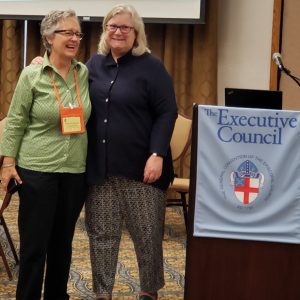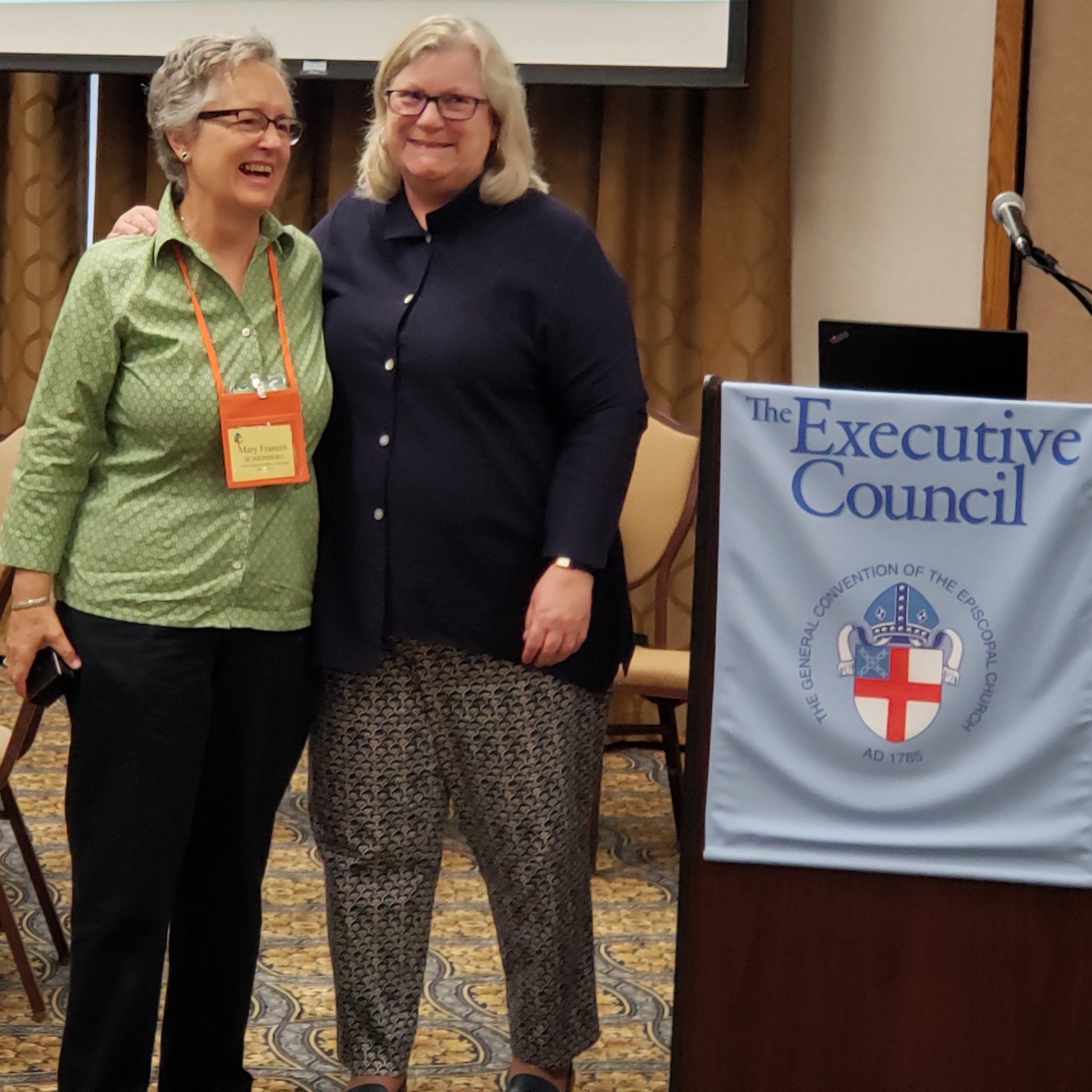President Jennings gave these remarks to the opening session of Executive Council on June 10, 2019, at the Maritime Center.
 Good morning. Welcome, once again, to the Maritime Center. I’m looking forward to our meeting, and I particularly want to welcome our guests Dr. Ursuline Bankhead, who will lead our implicit bias training this afternoon, and Dr. Mathew Sheep, who we will hear from later in this session.
Good morning. Welcome, once again, to the Maritime Center. I’m looking forward to our meeting, and I particularly want to welcome our guests Dr. Ursuline Bankhead, who will lead our implicit bias training this afternoon, and Dr. Mathew Sheep, who we will hear from later in this session.
Last week, I had the opportunity to join the staff of the Episcopal Church Center for its in-house meeting. I enjoyed the chance, as always, to spend time with the dedicated people who help implement the work of General Convention and Executive Council, and I was glad to talk with them about why their work is essential to the mission of the church.
When I met with the staff, I reflected on the 75th anniversary of D-Day, which we observed last Thursday. On D-Day, Allied troops landed on the beaches at Normandy, beginning the liberation of France that led to victory on the European front of World War II. This milestone—the last significant anniversary on which we will have D-Day veterans among us—has been memorialized with a new round of articles and documentaries and exhibits and even the re-release of the epic 1998 film “Saving Private Ryan.”
The anniversary has given us much to reflect on: about peacemaking and just war, about xenophobia and genocide, about imperialism and global alliances, about our relationship with Great Britain and other European allies. But the reason it’s on my mind now is that I believe it provides us with an opportunity to consider the role of institutional structures in changing the world.
Now, let me hasten to say that I am not a warmonger, nor do I have a rose-colored understanding of America’s imperial past—or present. The glorification of battlefield sacrifice and the version of masculinity that it has promoted are deeply problematic for Christians and other humans.
But I am fascinated by the fact that, 75 years on, we are captivated by the soaring rhetoric of the Allied leaders, by Churchill’s speeches and Roosevelt’s Fireside Chats, and by the vast logistical and operational undertaking of landing 156,000 troops on the beaches at Normandy. At the same time, however, we are deeply suspicious of the kind of institutional structures that made it possible.
As we glorify Private Ryan and his comrades, we proclaim that we live in a post-institutional age. We do not want hierarchies, we want networks. We seek to flatten structures and decentralize power. In the church, every three years, we go to General Convention to debate the budget, and we hear about how we should be funding mission, not governance and institutional structures. As though the mission happens by magic.
If we intend to be the Jesus Movement—and we do!—we have to focus on how we are actually going to move. We have to remember that governance is mission, just the same as programs that more commonly get defined that way. General Convention’s commitments to creation care, racial reconciliation and evangelism would mean very little without the governing structures of the church that help make them happen.
Now, many people here today have made significant contributions to making mission happen through governance, and I am grateful to all of you. But one of you has done more than anyone I know to help Episcopalians everywhere understand the ministry of church governance.
Mary Frances Schjonberg, Episcopal News Service’s senior editor and reporter, has reported the church’s news for nearly fourteen years as a staff member, and for a couple of years before that as a freelancer. She is set to retire on July 1, so let me tell you a little bit about her career at ENS. Mary Frances has covered six consecutive General Conventions, four consecutive meetings of the Anglican Consultative Council, the 2008 Lambeth Conference, and—this will make you dizzy—41 of the last 42 Executive Council meetings. Yes, that’s right. Forty-one Executive Council meetings.
Now, I have attended far more of the meetings that Mary Frances has covered than I care to remember. But, thanks to her, I don’t have to remember. Mary Frances’s stories, archived on the ENS website, are clear, carefully reported, accurate and detailed. Her journalistic standards and integrity set a standard not only for all other journalists, both in and out of the church, but for all of us whose job it is to govern the church and to make that governance transparent. She has always—always—advocated for, and sometimes, when it was necessary, fought for, transparency in governance. Even when it was unpopular. Even when there was a cost for her. We all owe her considerable gratitude for her uncompromising standards.
Because the House of Deputies has helped to make some of the news that Mary Frances has reported, I can tell you that one of the reasons her stories are so good is that she asks perceptive questions, she goes out of her way to talk with people on all sides of an issue, and she seeks out people who are not just the usual suspects. As a usual suspect, I am particularly grateful for that.
Mary Frances has covered the election and tenures of Presiding Bishop Katharine Jefferts Schori and Presiding Bishop Michael Curry, the story of Bishop Gene Robinson’s election and episcopacy, and the church’s move toward the full inclusion of LGBT people. When her retirement was announced, Mary Frances said, “I have been blessed to have what all journalists hope for: the chance to witness history and be able to write about it.”
When the retirement news broke on Facebook, praise for Mary Frances flowed in from around the church. “I always feel better connected to and informed about what is taking place in various parts of TEC after reading your stories,” wrote Deputy Cindi Bartol of Virginia. “Thank you for excellent and insightful reporting,” wrote Deputy Vanessa Glass of California. Deputy Mary Beth Rivetti of Spokane made an excellent attempt at simply forbidding Mary Frances to retire, and I commend her for it. But it turns out that even fear of a deputy’s displeasure could not forestall the inevitable, and come July, Mary Frances and Sharon will be bound for new adventures, both near and far.
Mary Frances, it has been a privilege to witness your work across the Episcopal Church and around the Anglican Communion for so many years. For your commitment to the governance of our beloved church, for your dedication to transparency and truth, and for your ministry of journalism that has been so essential to the work of the people of God, I am honored to present you with the House of Deputies Medal.
photo courtesy of Kirk Petersen, The Living Church


